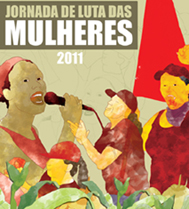MST Informa No. 189: WOMEN IN THE FIGHT AGAINST AGROCHEMICALS [3-4-11]
The women of Via Campesina held a National Day of Women’s Struggle in light of March 8 - International Women’s Day – to denounce the extreme gravity of the situation in the Brazilian countryside.
extreme gravity of the situation in the Brazilian countryside.
Demonstrations were held in ten states, in the form of acts, marches and protests in businesses and on highways. The feminist cry of peasant women against pesticides and against violence against women was echoed by Brazil. More than 15,000 women have already given the message: against poisons in food and against oppression in everyday life. Read what happened in all the states on MST’s web page: http://www.mst.org.br/jornada-de-lutas-das-mulheres-2011 [and also on this website below].
Agribusiness is the combination of large-scale land ownership, financial capital, chemical and metallurgical industries, public funding and media. Based on production in the form of monoculture, agribusiness is the new face of landlordism.
Keeping the logic of production in large areas of land increasingly concentrates poor working conditions, devastation of natural resources, slave labor and production for export.
This model leads to the expulsion of the peasant and traditional peoples from their land, contamination of workers and deepening environmental crisis and climate change. This current development model for the rural farmland seeks to maintain a standard of production and consumption that is environmentally unsustainable and socially unjust.
Brazil has been the largest consumer of pesticides in the world since 2008. In 2009, the country consumed 1 billion liters of poison. If we divide this amount per capita, it yields 5 liters of poison consumed per capita per year.
Life in the countryside and food production are threatened by the disappearance of native seeds, loss of biodiversity, and a threat to food security due to the commercial release of transgenic crops, the use of pesticides and the expansion of monoculture crops for export.
Furthermore, control of the food production chain by large transnationals threatens food sovereignty and the health of the people. This model of development is devastating.
Public Financing
The government has become a strong ally of agribusiness and the pesticides industry in Brazil. In addition to public funding for the companies, the government
strengthens the market through tax incentives with exemptions of 60%.
The funding and tax exemptions are the hand of the state guaranteeing
increased use of poisons in Brazilian agriculture. But other factors, like the lack of strict enforcement of environmental laws and health regulations including supervision of company stock and pesticides use, contribute to their strength.
Therefore, women have mobilized to provide an alternative to this production, agroecology. This model is based on small-scale land ownership, of Agrarian Reform and of the rural peasant’s cooperative agriculture, to produce healthy food and to preserve of biodiversity. The land, water, and seeds are property of nature that
should be used to serve human beings and society as a whole.
To face this situation of contamination and destruction of the climate, Via Campesina proposes the following measures to society and the government:
- That the federal government creates a federal law banning the aerial spray of
pesticide: Law of Zé Maria do Tomé;
- That the government and legal agencies (IBAMA, ANVISA, etc.) fulfill their role of monitoring and punishing companies that commit irregularities and of banning poisons already banned in other countries;
-Suspension of all tax incentives for the production, marketing and use of pesticides and ending subsidized credits for companies committing environmental and social crimes;
-Disclosure and expansion of existing university studies as a means of measuring social and environmental impacts and informing the public about the risk of pesticides on health and the environment;
-Suspension of production, marketing and use of pesticides in Brazil;
-Environmental restoration of areas affected by pesticides;
- An immediate ban on production and marketing of transgenic products;
- Expropriation of land involving environmental crime and immediate disposal for
Agrarian Reform;
- Credits to support the agro-ecological production of food produced
by peasant farming.
The rural social movements remain committed to fight and permanently denounce all forms of violations of rights and crimes committed by transnational corporations.
National Secretariat of the MST
Translation by Kate Polakiewicz
